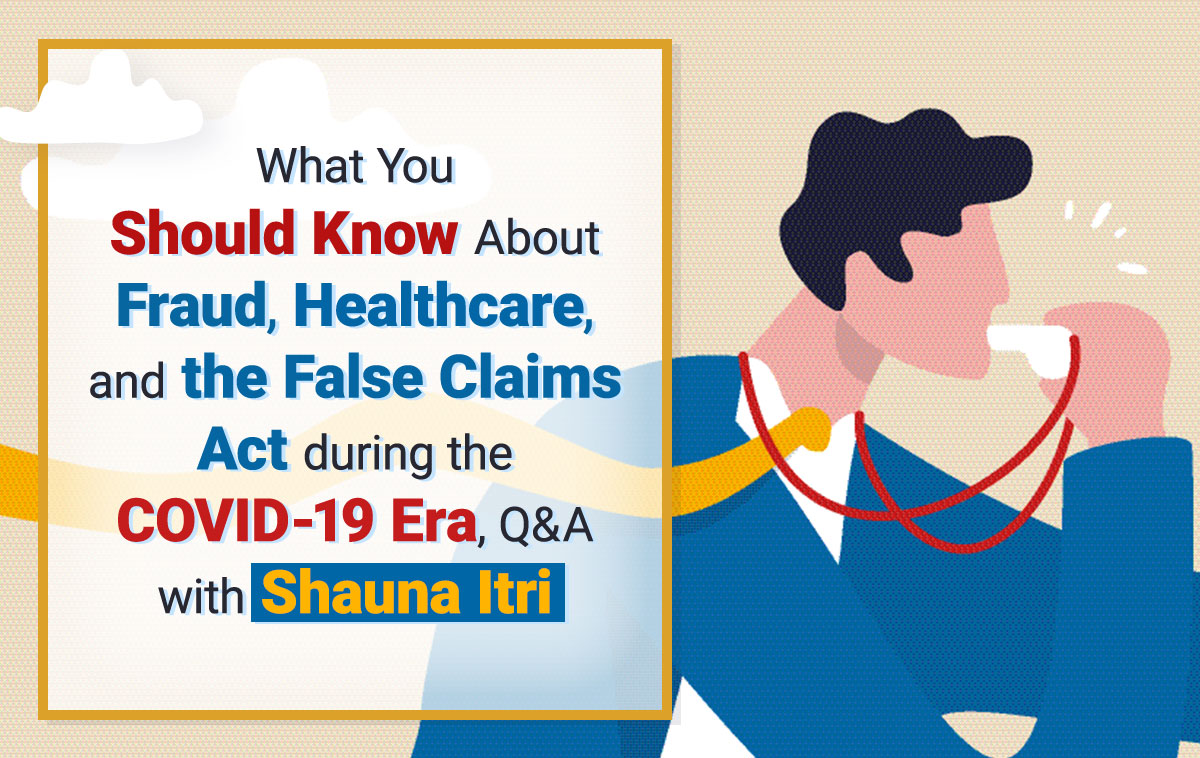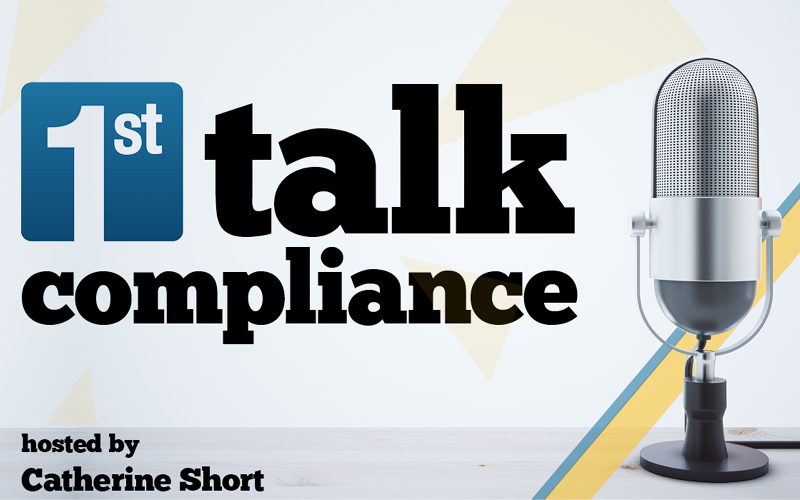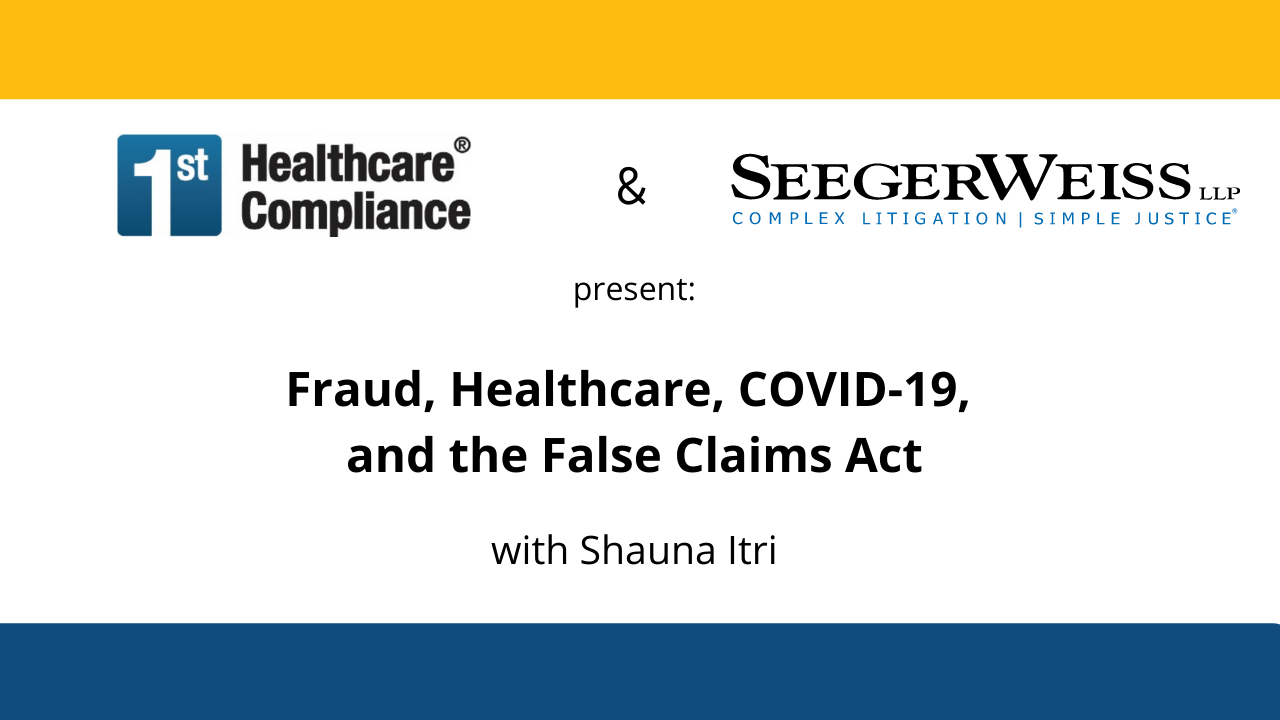What You Should Know About Fraud, Healthcare, and the False Claims Act during the COVID-19 Era, Q&A with Shauna Itri

Shauna Itri, Partner at Seeger Weiss LLP recently presented the webinar “Fraud, Healthcare, COVID-19, and the False Claims Act.” Shauna returned to answer many commonly asked questions from the webinar.
Can someone be retaliated against for filing a False Claims Act case? Are there any protections?
Absolutely, and yes. Thankfully there are incentives and protections involved in filing a qui tam case. The incentive comes in the form of a monetary award. If a qui tam case is successful, the whistleblower will get a portion of the recovery. The percentage depends on several factors and ranges between 15-30% of the total amount the government recovered. This can amount to millions of dollars. In addition to incentives, whistleblower protections are built into the False Claims Acts. The specific provision is 31 U.S. Code § 3730(h). In general, an individual who is retaliated against for reporting fraud can file a False Claims Act retaliation claim. If the whistleblower is successful, he/she can be entitled to reinstatement, two times back pay, and other compensation.
What if there is fraud, but it doesn’t involve Medicare or Medicaid, rather private insurance?
Short Answer: You cannot bring a False Claims Act Case, but you can bring a case under the California Insurance Fraud Prevention Act. Long Answer: The California Insurance Fraud Prevention Act (“CIFPA”) or California Private Insurance Qui Tam Act is a unique whistleblower law. Explained further, it is unique because the law allows individuals to sue on behalf of private insurance companies. It’s one of two laws that allows individuals to sue on behalf of private insurance companies (the other one is Illinois). Additionally, if the case is successful, the individual who brought the lawsuit, receives a portion of the recovery. In other words, there need not be government harm to pursue a case under the California Private Insurance Qui Tam law. Rather, private insurance companies have to suffer harm. By way of example, let’s say a whistleblower has a False Claims Act case alleging that a doctor routinely billed Medicare for services that the doctor did not provide. If that doctor practices or sees patients in California and if that doctor does not discriminate on who he/she is charging, meaning, the doctor also bills private insurance companies for services that the doctor did not provide. Then the whistleblower also has a case under the California Insurance Fraud Prevention Act. The California Insurance Frauds Prevention Act is codified at Ins. Code §§ 1871 et seq. The CIFPA allows whistleblowers to fight private insurance fraud. More specifically, whistleblowers can bring qui tam cases against any person or company that defrauds private insurance companies. Under the California Insurance Qui Tam Statute, rather than bringing the case on behalf of the government and fellow taxpayers, the whistleblower brings the case on behalf of the government and fellow policyholders. The California Insurance Fraud Prevention Act is modeled after the Federal False Claims Act. Thus, its not hard to imagine that the CIFPA operates in a similar fashion.
Damages under the California Insurance Fraud Prevention Act are similar to damages under the False Claims Act. For example, if found to have violated the CIFPA, a person or company can be fined from $5,000 to $10,000 per violation. Additionally, the person must pay damages of three times the amount of money the fraud cost its victims. However, one of the differences between False Claims Act cases and California Insurance Qui Tam cases is the amount of the reward. Put simply, the California Insurance Fraud Prevention Act provides for larger qui tam rewards. Whistleblowers that bring successful actions under the CIFPA are rewarded with 30-40% of the recovery. Whistleblowers receive at least 30% of the recovery in CIFPA cases where the government intervenes. Whistleblowers receive at least 40% of the recovery in cases that the government declines.
If the government declines, can my case still go forward? Can the government dismiss my case?
One of the pivotal moments in a False Claims Act case is the government’s intervention decision. The government can choose to intervene in the case, or take it over, or decline the case. There are many reasons why the government may decline a case, including that it does not have the resources to pursue the case. If the government declines to intervene in a whistleblower or relator’s case, then pursuant to 31 U.S. Code § 3730(b)(4)(B) “the person bringing the action shall have the right to conduct the action.” While not often utilized, the government may dismiss the action notwithstanding the objections of the person initiating the action if the person has been notified by the Government of the filing of the motion and the court has provided the person with an opportunity for a hearing on the motion.” 31 U.S. Code § 3730(c)(2)(A). Indeed, a confidential internal memo was leaked on January 10, 2018 from Michel Granston, the Director of the DOJ Commercial Litigation Branch, Fraud Section containing factors for evaluating dismissal pursuant to 31 U.S. Code § 3730(c)(2)(A). The memorandum also stated that this power has historically been used sparingly and “it is important to be judicious in utilizing section 3730(c)(2)(A).” There has been a circuit court split that has existed over the standards for a court’s review of the government’s power to dismiss a case under this section. In April 2020, the U.S. Supreme Court had the opportunity to settle this dispute and provide guidance on the standard of dismissal in United States ex rel. Schneider v. JPMorgan Chase Bank, N.A.(No. 19-678); however, it denied a petition for certiorari. So still, some Courts hold the view that the government has an unfettered right to use its dismissal authority and others, require the government to demonstrate that the dismissal is rationally related to a valid government purpose
 For well over a decade Shauna Itri, Partner at Seeger Weiss LLP, has been leading litigation teams in complex fraud cases in both state and federal courts. Shauna’s nationwide practice has focused on representing plaintiffs in various settings, including class action securities and consumer matters; antitrust; and cases involving patient harm. Shauna also has extensive experience representing whistleblowers in False Claims Act lawsuits, and tax and securities whistleblowers with claims under the IRS and SEC whistleblower programs.
For well over a decade Shauna Itri, Partner at Seeger Weiss LLP, has been leading litigation teams in complex fraud cases in both state and federal courts. Shauna’s nationwide practice has focused on representing plaintiffs in various settings, including class action securities and consumer matters; antitrust; and cases involving patient harm. Shauna also has extensive experience representing whistleblowers in False Claims Act lawsuits, and tax and securities whistleblowers with claims under the IRS and SEC whistleblower programs.
Prior to becoming an attorney, Shauna received a B.A. and an M.A. from Stanford University, where she was two-time captain of the University’s women’s nationally ranked soccer team. She received her J.D. from Villanova University. Shauna is an avid volunteer and educator and has served as an adjunct professor at Villanova University and Widener Law School, teaching corporate deviance courses. Shauna currently serves as co-chair of Stanford University Alumni Undergraduate Admissions Volunteer Interview Program, and is the President of the Junior League of Philadelphia, Inc.
Be sure to view a recording of this webinar here and don’t miss our many other expert webinars, podcasts, and blogs with Shauna, which can be found here. Explore our Shop which includes on-demand webinars, compliance posters, and books.






